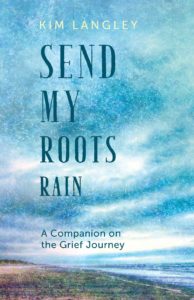Poetry illuminates the darkness and companions the loneliness of grief. When you lose someone, you feel lost. In times of sorrow, poetry can be a light, a solace and guide.
Well-intentioned friends and family, trying to help, may offer platitudes such as:
- Time heals all wounds.
- You’ll have another baby.
- God must have needed him more than you did.
- She/ he lived a good long life.
- Their suffering is over.
- They wouldn’t want you to still be grieving.
- You should get back out there and (date, dance, join a book club etc.)
- I’m not sure it should take this long for you to move on.
This kind of advice is probably about as welcome to you as wilted funeral flowers, leaving you isolated and in a place of despair. You may not think of poetry as a powerful resource to help sort out your feelings. But poetry can create a tender space for reflection, offering words that can’t be articulated otherwise.
Poet Jane Hirshfield knows. She wrote, “To step into a poem is to agree to risk.” The good and hard work that is grieving certainly feels like risk.
Loss has a way of dividing your life into “before” and “after,” leaving you forever changed. Every day you do your best to shower, brush your teeth, and keep putting one foot in front of the other and you ask “What’s next?” Poets have stood where you stand now. Poems are a source of consolation, strength, and a springboard for meaningful conversations. Poems sing, weep, and steadfastly embrace you.
State Poet of New York, Marie Howe writes, “Every poem holds the unspeakable inside it. The unsayable… The thing that you can’t really say because it’s too complicated. It’s too complex for us. Every poem has that silence deep in the center of it.” Marie Howe knows. She lost a brother to AIDS.
Stanley Kunitz wrote a poem called “The Layers” in which he asks: “How shall the heart be reconciled/to its feast of losses?”
Yes how? And think of that image—a feast of losses. We try hard to put aside this knowing, but if we live richly, with hearts open to intimacy, each of our lives could set out such a banquet.
No wonder Robert Frost’s poem “Nothing Gold Can Stay” is a favorite. It captures in such simple language the ephemeral nature of so much that we love:
Nothing Gold Can Stay
Nature’s first green is gold,
Her hardest hue to hold.
Her early leaf’s a flower;
But only so an hour.
Then leaf subsides to leaf.
So Eden sank to grief,
So dawn goes down to day.
Nothing gold can stay.
You may have lost someone close at a time when you felt that there was no space to grieve. Some have experienced what’s called “disenfranchised grief.” This refers to being made to feel ashamed about our grief, or having a secret sadness, or sorrow that others trivialize. We may have been too busy raising kids or in too demanding a job to give ourselves permission to express, or even feel, the harm in the way we wished. It may never have occurred to some that the death of an ex-partner or spouse requires normal grieving. A parental abandonment of the family, an incarceration, a missing person, a miscarriage, a divorce, a traumatic job departure, or death of any cherished dream is a disenfranchised grief. Such pain may be silently clamoring for attention.
You may be suffering the slow and anticipatory grief of the diminution of elders who are disappearing into one of the many types of dementia. You may be a cheerful (or not), exhausted caregiver. You may be reeling from a sudden or shocking bereavement, a violent death, or the emotional havoc of losing a child.
Maybe you are struggling to come to terms with this pain. Some days you feel you are getting along well, other days you can hardly get out of bed. That’s normal.
Our lives are bittersweet. Nothing gold can stay, our younger selves, our loved ones, our faculties, or our passions. It can all change in a moment. Our grief is our own, and we are achingly alone with the wearing of it. Ask people who have suffered the collapse of their world, and most will say the same thing—I never imagined it would be like this.
When you’re lost, you don’t blame the forest. It’s a forest. People get lost. So there you are, with your back against a tree, trying not to panic, and your muscles screaming, and what do you wish for? A friend, a guide, even a compass would be welcome. A way to name the unnamable feelings and thoughts that surround deep loss, and to help us to come home to our fractured hearts.
Poetry, at its best does not try to cure, explain away, or eliminate grief. Ask any hospital chaplain who brings poems to the bedside, or any social worker who begins a support group with a poem, why they offer this form of consolation. You will hear some version of, “poetry allows room for mystery.”
Poet Donald Hall wrote a moving memoir and compelling poems as he came to terms with the early death of his beloved wife, poet Jane Kenyon. In his memoir The Best Day the Worst Day he writes, “Poetry gives the griever not release from grief but companionship in grief.”
Rachel Naomi Remen said, “Perhaps real wisdom lies in not seeking answers at all. Any answer we find will not be true for long. An answer is a place where we can fall asleep as life moves past us to its next question. After all these years I have begun to wonder if the secret of living well is not in having all the answers but in pursuing unanswerable questions in good company.”
Poetry can be that companion, as it has been throughout the ages.


Excerpt from Send My Roots Rain: A Companion on the Grief Journey







Poetry … a springboard for meaningful conversation rather than platitude certainly hits the mark for mr today. Thanks for sharing this profound essay.
Send My Roots Rain is a wonderful companion for exploring grief and highly recommend for anyone who has experienced a loss and for those who seek to understand and support others during the grief journey. Thank You Kim Langley for this labor of love!